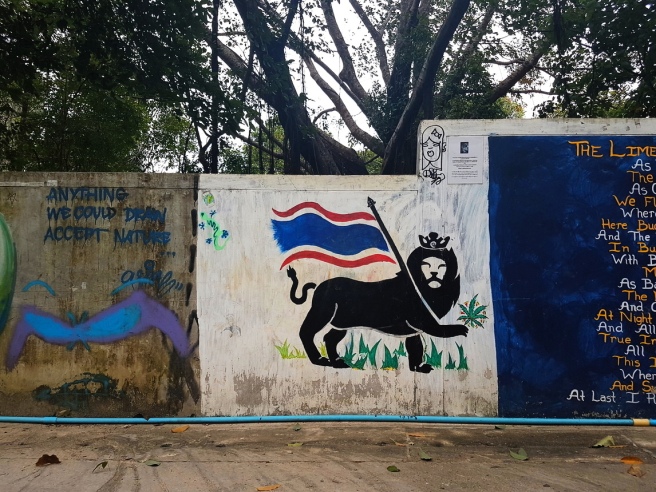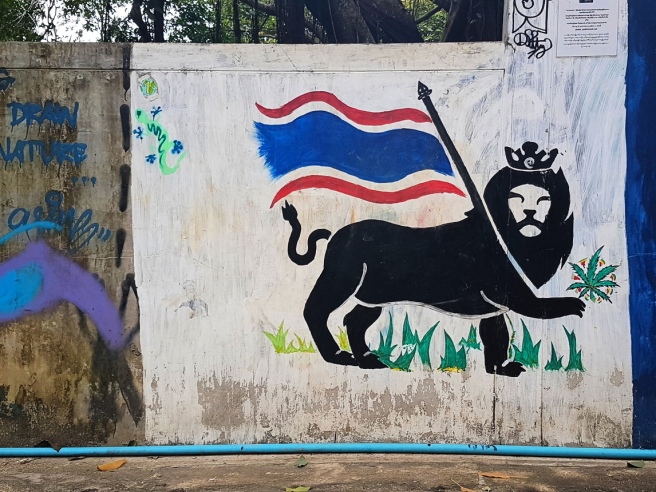This piece of graffiti was seen in Southern Thailand in 2017. Does that Lion appear familiar to you in any way? While being a striking design in its own right, this Lion holding the Thai flag acts as a subtle nod toward the recent success that Thailand has had in the Premier League.
The current Premier League logo redesigned a couple years ago only features a facial profile of a lion. But the previous EPL logo displayed the full body of a proud lion with one front paw raised slightly to rest on a Football while the animal’s face is turned to look directly at the viewer. The subject’s pose is extraordinarily similar to that of the lion in this piece of graffiti, the exception being that the raised paw is sporting the Thai national flag instead of being placed on a Football.
Far from being coincidental, the resemblance that exists between the two designs shares a subtle, but very much intentional, message about the influence that Thai people have had in the Premier League.

From Boothferry To Germany has intentionally avoided discussing Leicester City’s 2015-2016 Premier League triumph until now, simply because we saw most other Football blogs doing it. We certainly applaud the Foxes for their achievement, we just didn’t bother jumping on the blogging bandwagon just to clickbait. What’s more, we are not particularly concerned with how the feat was achieved with regards to managerial tactics or strategy, topics that again have been covered extensively by other bloggers. No, what matters more in the context of this post is that Leicester City’s Premier League title was achieved under the ownership of a certain Vichai Srivaddhanaprabha, one of Thailand’s wealthiest individuals.
You are probably aware of the enormity of the Premier League’s global visibility. In developing and tech-savvy South East Asia, sports and Football enthusiasts closely follow English Football, a phenomenon exploited by the Big Clubs’ marketing execs who deliberately engage with Asian audiences for the sake of increased merchandise sales. Football fans in Hanoi, Kuala Lumpur and Yangon know the Premier League inside out, often having favourite clubs and players, and thus are very aware of Leicester City’s shock league title. But nowhere is this a bigger deal than in Thailand itself. The Thai people have followed the purchase and stewardship of Leicester City by their compatriot (Mr Vichai Srivaddhanaprabha), observed the unlikely triumph of the East Midlands club and inserted the narrative of Thai success in the English Premier League, the world’s most popular and prestigious Football league.
Call it far-fetched to argue that Leicester’s league victory is a direct result of the nationality of its chairman and owner, but the Thai people themselves are ready to demonstrate pride in their nation’s perceived success in the most competitive and international Football league in the world. This form of blind patriotism is very common among citizens of young countries. People from nations that have gained independence within our lifetimes are quick to indulge in celebrations of national sovereignty previously denied to them, often doing so at Football matches. Unlike modern day citizens of predominantly Western countries that boasted large empires a century ago who are now forced to acknowledge the harm done by their countrymen to the colonised, Poles, Croats, Ukrainians, Indonesians, Vietnamese etc are in a position to explore nationalist sentiment and unreserved patriotism (relatively) free of guilt, as they are more likely to make the positive association between nationalism/ patriotism and their own independence movements.
The astute among you will point out that Thailand was never colonised by a Western power the way that other modern South East Asian nations were. The Royal Family of Siam (as it was known at the time) watched neighbouring Burma’s failed attempts to resist British colonisation in the 19th century from a distance and duly cooperated with the technologically superior British Empire to ensure their sovereignty without comprising British mercantile interests in the region (ditto French interests in Indochina). However, while the Thai people may not be exploring their country’s newfound independence, they still view Western nations as dominant powers in the world (ignoring China momentarily). And as such, the victory of a Thai-owned Football club in the Premier League holds a special place in the minds of the average Thai who takes pride in his/ her countryman’s success in the leading Western sporting competition.
The message behind this piece of graffiti conveys that narrative; the Premier League Trophy belongs to Thailand. Or at least it did in 2016, the year before this photo was taken.

FBTG attempted to find the artist behind this piece of graffiti in the hope of speaking directly to him/her, but were unsuccessful in doing so. Free FBTG merch to anyone who can help us track the artist down.

Great post 😁
LikeLike